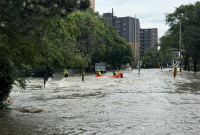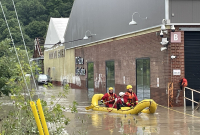Thank you for helping us meet our fundraising goal!
Like countless others, I got caught in the chaos created by the extreme rainfall that hammered the GTA last week.
A trip that usually takes me less than two hours took almost five — and I wasn’t sure if I would make it home at all. My train was cancelled, my station was closed, and flooded intersections and malfunctioning traffic lights resulted in countless delays and detours. My bus had rerouted, stranding dozens of us at a stop that had to be bypassed entirely.
As I walked north to try to find an operating stop, I passed a string of stalled-out streetcars and watched water rush through the cement walls of the bridge at King St W and Atlantic Ave, covering the sidewalk and pouring onto the road.
On social media, I saw terrifying videos of cars floating down the Don Valley Parkway, a waterfall cascading down the stairs at Union Station, and friends trying to empty half a foot of water from basement apartments. I read about flooded restaurants, daycares, schools, and local businesses. I heard from loved ones who were among the 167,000 people who lost power in one of the biggest outages in recent memory.
The widespread chaos and infrastructure collapse that hit my city last week was inconvenient, scary, and dangerous. But, unfortunately, it wasn’t a surprise.
Five years ago, Kim Gavine, general manager of Conservation Ontario, warned that the province was already “experiencing stronger and more frequent flood events as a result of climate change impacts."
Instead of taking this threat seriously, Doug Ford slashed Ontario’s funding for flood management programs and has recklessly tried to pave the Greenbelt, a crucial network of protected waterways and wetlands that help prevent flooding. By prioritizing the interests of his corporate developer buddies and expanding gas power plants when we desperately need to be transitioning to a green grid and investing in proactive resilience measures, Ford is making communities across the province more vulnerable to climate disasters like what I just experienced.
This isn’t just a Toronto or Ontario problem either. David Phillips, senior climatologist with Environment and Climate Change Canada, described last week’s massive urban flooding as our new reality. Our governments, at every level, need to do what it takes to better prepare for these escalating climate impacts everywhere.
We don’t yet know the full extent of the damage from last week’s storms, but Global News' Chief Meteorologist reported that the flooding was likely to be “worse and more widespread than the recent benchmark event in July 2013 and that was a billion-dollar disaster.” A billion dollars that our already strapped municipal government doesn’t have, money that we desperately need for housing, transit, and social services.
It’s neither realistic nor fair that communities should have to shoulder the burden of costly climate disasters. Not while the fossil fuel corporations that created the climate crisis are raking in record profits.
That’s why my organization and others have been campaigning for a federal tax on Big Oil’s excess profits to fund climate action and direct support for communities affected by climate disasters. Over 15,000 people across the country have joined us to demand that polluters — those responsible for crises like the floods that hit my community hard last week — pay up.
A windfall tax on the fossil fuel industry is a common sense policy the UK, the European Union, and other governments around the world have already put in place. By taxing Big Oil’s excess profits, our government could hold polluters accountable, help climate-impacted communities, and get to the root cause of this crisis by accelerating the transition to renewable energy.
The climate movement came close to winning a windfall tax in the last federal budget, but the Trudeau government backed off at the last minute after intense lobbying from the fossil fuel industry. The climate impacts we are experiencing across the country this summer — from extreme heat to extreme rainfall — have made it clear we can’t stop pushing. With a federal election looming, holding Big Oil accountable would be a powerful way for Trudeau to demonstrate a commitment to communities across the country impacted by climate chaos.
I’m not sure how long it will take to clean up the mess that last week’s storms caused in Toronto. And I’m not sure how much the recovery and rebuilding will cost when all is said and done. But I am sure that more storms and floods are on the horizon. We need our governments to act decisively to address the climate crisis — and make Big Oil clean up the mess they made.
Johanna Lewis is a senior organizer for 350 Canada, an organization working to grow the movement for bold, ambitious climate action. Johanna’s team is running a campaign to make polluters pay for the climate crisis and a just transition.






Comments
Good luck on getting Doug "The Thug" Ford to do anything related to climate or environment issues. His only focus has been to fill the pork barrels of his corrupt developer donors. This province needs responsible government. Doug needs to be kicked to the curb before he causes any more damage to Ontario with his short sighted vision, and his continued erosion of environment and climate change regulations.
I fully agree. And let's remember Poilievre's feckless three word response to the Toronto flood situation "stay safe Toronto!" It was all Poilievre could muster, quickly reverting to his core message of inflation, scapegoating the carbon tax and pitting climate action against affordability. Meanwhile, the insurance industry was estimating the single day of summer flooding would easily cost over $1 billion in damages.
Electing Poilievre would be an environmental blunder of great magnitude, so why are people buying his message?
How much longer do we have to watch this "dance" with deadbeats and the club-footed, a.k.a. the conservatives among us? To accuse them of slowing us down is an understatement; they're willfully DRAGGING us all down now.
There's not a shred of subtlety left here. When you read the link in this article from 2019 where Doug and the Thugs cut environmental funding, including for flooding, and not just by a little bit as in the usual sneak attack, but boldly and shamelessly IN HALF, what more do you need to start to sideline these dangerous climate heretics? These true non-believers who simultaneously and paradoxically display a proud belief in the god MYTH are just asking for it.
A current, classic federal example, so even more consequential, apparently lead heretic for the CPC (which could rightly mean the Christian Party of Canada), master stoker-in-chief Poilievre is starting to appear at churches in his campaigning so is deliberately courting and thereby deepening THE societal conflict to end all societal conflicts (literally) between science and religion, a.k.a. the sacred, shining TRUTH versus a pernicious, persistent lie.
How long before SOMEONE in the mainstream media starts to frame this reality in their reporting? It's not just the Liberals who lack courage here; it's the mainstream media, and to the extent that it's an important, relevant and accepted theme, it's ALL MEDIA.
Especially now that we KNOW that simple repetition WORKS on most people, largely unbeknownst to them, why keep pussyfooting? So as not to OFFEND the masses of deluded? What's wrong with reviving the whole separation of church and state and the sanity of secularism like Quebec and France keep TRYING to do, implicit criticism notwithstanding? They're on the right side of history.
Will the rule of law/democracy's defining phrase, "the truth, the whole truth, and nothing but the truth" ever regain its rightful place? It's so refreshingly uncluttered, and never more needed.
The main media is all right leaning and biased, which has been obvious that conservatives can do no wrong, and are freely given 'get a out of jail' cards freely. On the other hand, if Justin Trudeau and the Liberals fart, the main stream media turns it into a scandal.
Pierre "Snake Oil Salesman" Poilievre is a dangerous conman, who has dupped many Canadians into believing he is there for them. Basically using the same Trump playbook that conman & felon Trump has been using. In the end, neither have done anything for the people but enrich themselves, Pierre's ties with religious fringe groups should be setting off warning bells of things to come. Women beware, with Pierre not disclosing his position of on women's rights in this country is a clear sign, they have a hidden agenda and driven by these fringe religious groups. For all the years Pierre spent as an MP, he has accomplished ZERO as a sitting member, but the only thing he has tried to do was rig elections.
Amen. In the "mall" parking lot here in Lethbridge I saw on the bumper of one of the MANY Mad Max, military style trucks here, "Weneedalaw.com." If it's still up, it's about an abortion law HERE. There's a massive "pro-life" network that gives away its right wing bias with the slogan itself, "pro-life." Who ISN'T for LIFE FFS? But to mislead mightily is their one skillset so they throw that out there to hide the truth, which is that they value the "life" of fetuses more than full-grown women as if fetuses (or the "preborn" as they stupidly say) are free-range. Maybe because, as true believers, ANY discussion about the human body especially in the context of sexuality, makes them blush? Well there's THAT, but the bottom line, they just want to control women the way they have all through history so birth control is next on the U.S. Supreme Court's list, along with gay marriage (because homosexuality is simply a LIFESTYLE after all, hence "conversion therapy" as the "remedy") and then they can't wait to straighten out the whole LGBTQ community.....
One of the reasons the cons here are conning people so effectively is that most people's limited attention span for politics is focused on the three-ring-circus of Trump/P.T. Barnum. We imagine we're "different" but we're not; it's all a matter of scale.
So a woman moving into position to challenge the proud boy BS as a seasoned prosecutor thereof is the most hopeful thing in a long time.
Could this finally convince Ontarians to vote Ford out next time? I sure hope so.